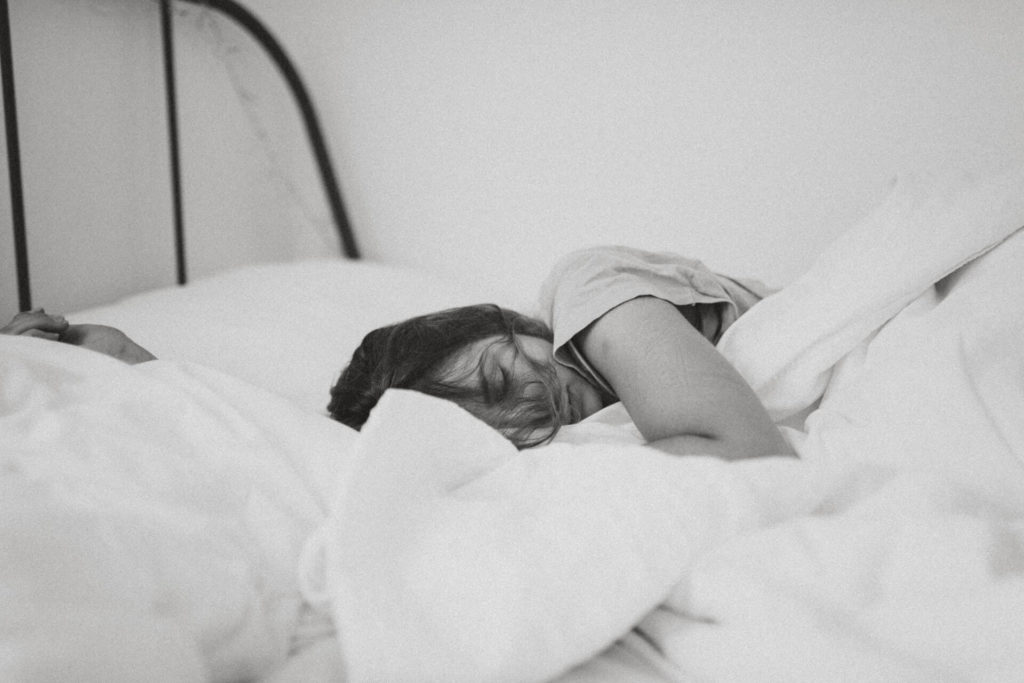“1 more episode…?”. Sounds familiar? Many people don’t get enough sleep, either because there are so many fun things to do (such as Netflix) or because they are so over-stimulated or stressed that they can’t seem to fall asleep at night. Getting enough sleep is very important for your physical and mental recovery. Too little sleep can cause problems; you do not regain enough energy, you feel tired and you can develop other physical or mental complaints. Are you having trouble sleeping? In this article, I’ll give you a practical plan on how to prioritize your sleep and sleep like a baby again.
What affects your sleep?
Sleep is influenced by many factors. A number of important factors are: the amount of activity and movement during the day, the amount of daylight you are exposed to (affects melatonin production), what you eat, your evening routine, your day-night rhythm, alcohol and caffeine, blue light (from screens) and relaxation.
Below you’ll find a practical explanation of how you can use this knowledge to make a plan to improve your sleep quality and quantity. If you want more detailed information about sleep or know how the hormone melatonin affects your sleep, try to search for “sleep” in the search bar of www.niceday.app.
Your plan to a good night sleep
This plan focuses on sufficient daylight using a daylight lamp* (white light with a strong intensity of 10,000 lux, for example this one), taking melatonin* temporarily, rhythm, healthy habits and assistive nutrition, with the option of supplements.
In the morning
- The moment you get up determines when your biological clock starts. That is why sleeping in during weekends is not recommended. Staying in bed for an hour longer than usual is fine, but if you have sleep problems, it is best to get up at the same time every day.
- Maintain a steady rhythm in the morning:
- Set the alarm clock to 7.30 a.m. (no later than 9 a.m. on your day off)
- Don’t snooze; immediately open the curtains and switch on the daylight lamp for 15 minutes.
- After that, get out of bed and go through your morning routine (shower, food, coffee). If possible, make sure you keep the daylight lamp close by.
- Then use the lamp for at least 30 more minutes, for example while working.
During the day
- Make sure you have at least 30 minutes outside exercising or walking during the day (in daylight). Walking has a relaxing effect on the brain, preferably in a quiet and green environment.
- Follow as little social media or news as possible (this produces stress hormones)
- Try to avoid sugar and processed foods as possible (no packets / sachets)
- Do not sleep during the day
- Keep an eye on your stress levels and ensure sufficient relaxation. Stress and poor sleep is a vicious cycle. The more stress you experience, the longer it will take you to fall asleep. And the shorter you sleep, the more susceptible you are to new stress. You can break this circle with relaxation.
In the evening
- Make sure you have light dinners, not too heavy or greasy. A handful of unroasted and unsalted almonds with or after dinner; this contains tryptophan and magnesium which can positively influence your sleep.
- Really cut back on the alcohol. Actually, it is best not to drink alcohol at all. Alcohol causes a greatly reduced quality of your sleep.
- No sugary foods and caffeinated drinks such as black tea, coffee, energy drinks and cola (also no diet / zero).
- Make sure your bedroom is optimized for your sleep; make sure there is a fres air flow, it’s cool, dark and has a relaxing interior.
- Really take the time to relax. After a busy working day, eating a bar of chocolate and scrolling through social media on your phone won’t let your stress level go down. Only when you make room for real relaxation can you effectively reduce stress.
- Maintain a steady rhythm in the evening. If you want to sleep at 11 p.m., you can do it like this:
- 9 p.m .: turn off the screens, dim the lights, take an optional magnesium taurate supplement* and relax, for example, a good night’s sleep, tea, walking, chatting, washing up, doing puzzles, taking a bath, reading.
- 9.30 pm: Optionally use low dose Melatonin (0.5 – 1 mg)* at a fixed time for up to a few weeks. If you forget to take it, don’t take it later! This actually disrupts your rhythm.
- 10:15 pm: Going to bed routine
- Write down positive things about the day
- Brushing teeth, washing your face, taking a shower
- 10.30 pm: relax in bed (10-30 min)
- Relaxation exercises increase certain brain activity (Theta waves) which have a calming effect.
- Unaccompanied breathing exercise or meditation: Breathe deeply and slowly through your abdomen, making your exhalation twice as long as your inhale.
- Guided Yoga Nidra (or yoga sleep). For example via the Insight timer app, search for “Yoga Nidra”.
- Listening to music, for example binaural beats. Via Spotify the Binaural Beats playlist from NiceDay.
- Reading a quiet book (not a thriller full of cliff hangers) or having sex.
- Relaxation exercises increase certain brain activity (Theta waves) which have a calming effect.
- 11 pm: light off and go to sleep. Can’t sleep? Get out of bed after 20 minutes, do something relaxing like doing puzzles or reading, and then try going back to sleep.
Help with your plan
This may sound like a lot, and changing your habits and routines can be quite a challenge! But, if you feel overwhelmed you can start doing this the following ways:
- Take small steps and choose the things that you think can best help or suit you. Slowly let this become your new routine.
- Or start an “experiment” in which you strictly follow your plan for two weeks. Within this time you will notice from experience what you like and what you don’t. After those two weeks you can continue to do the things you like and adjust the plan to your own liking.
I myself am always fond of rigorous experiments, but that is of course personal;) Both options are fine, choose what suits you and prioritize your sleep!
*Are you currently under treatment? Always talk to your professional about what is suitable for you.











